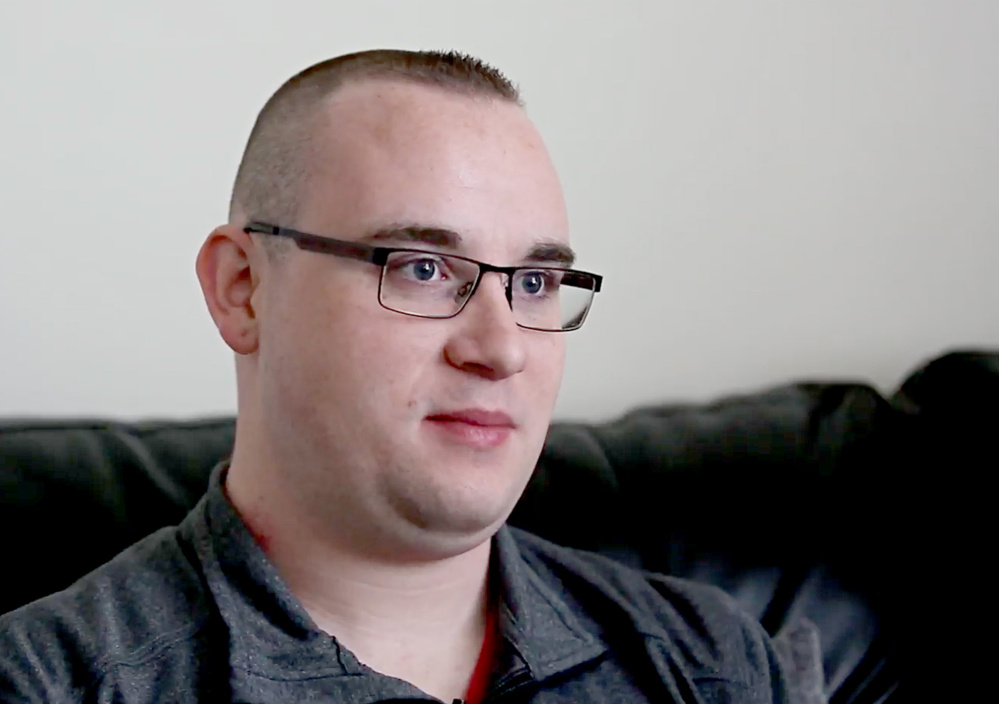More than a dozen containers of all shapes and sizes line a shelf in the Biddeford apartment shared by Mariah Trimble-Smith and her fiancé, Mike LaPointe. The word “wedding” is written in black magic marker ink on a big glass jar. An old coffee can is labeled “house.” And a canister that used to hold cashews now holds quarters and dimes for car repairs.
When the containers are full of the loose change they deposit at the end of each day, the money goes into their bank account.
“We’ve taken saving to a whole new level,” Mike, 25, says with a grin.
The same goes for budgeting.
“They taught us how to budget,” says Mariah, 24. “You give me a penny, and I can make like five dollars out of it somehow.”
“They” are Opportunity Passport, a financial education and matched savings program for young people currently or formerly in foster care. The program was developed by the Jim Casey Youth Opportunities Initiative and funded by that organization, private foundations and federal funding that flows through Maine’s Department of Health and Human Services.
Opportunity Passport teaches participants to set financial goals, establish credit, balance a checkbook. It’s the kind of advice that has helped Mike climb out of the sinkhole of credit card debt he found himself in in his early 20s.
“I made some horrible choices,” he says. “(Now) I’m not out spending a million dollars on something stupid. I’m spending it towards the future.”
The program also matches every dollar a participant saves up to $1,000 each year until age 26.
Since 2004, more than 500 young Mainers have saved and received matching funds, totaling $1 million.
That money is used for expenses that are part and parcel of transitioning to adulthood – things like rent, tuition, car payments, school supplies and medical costs. The matching funds from Opportunity Passport are paid directly to the third party.
“It’s not just a giveaway,” says Debbie Bechard, special projects manager at Jobs for Maine’s Graduates, the nonprofit that oversees the program. “They really have to work hard to save their portion of (each) purchase. There’s a lot of success in that. I see a lot of pride on the other side, like, ‘Wow, I did this myself. I saved enough money to be able to buy my first car or to help pay for books for this semester.'”
Mariah has used the matching funds to pay for a driver’s education course, buy a laptop and pay toward her tuition at the University of Southern Maine, where she is a junior majoring in social work.
It’s the kind of financial support that parents often give their 20-something children. But when you grow up in foster care, turning to Mom and Dad for a little help or advice isn’t an option.
“Some of these young people,” Bechard says, “haven’t had the experience of having an adult discuss even basic money things.”
“It’s very scary,” Mariah says, “because you don’t know if you’re going to be able to be (financially) successful and there’s no room for failure. … You don’t have parents to call.”
The lack of a parental safety net can undermine even the most determined young adult, says Marty Zanghi, program director at the Muskie School of Public Service at the University of Southern Maine, who has 25 years of experience in the child welfare field.
“When you look at the data, the majority of young people who leave the child welfare system have poor outcomes when it comes to mental health, health care, housing, employment, on and on and on,” Zanghi says. “We know that story too well. And we need to flip it.”
Opportunity Passport is one step in that direction.
“What I see over time,” Zanghi says, “is that they get better at goal setting, which can be hard for kids who have suffered trauma. It builds their confidence.”
And builds their commitment to a better life.
Kyle Snyder, 22, enrolled in Opportunity Passport three years ago.
“I was the kind of person that lived paycheck to paycheck,” says Snyder, who was placed in foster care when he was 3 years old. “I went to the financial literacy training and that’s when it clicked. Budgeting really has helped everything.”
Two years ago, he used matched savings to cover the first month’s rent on an apartment in Biddeford.
“I think for me growing up in foster care, being bounced from place to place, was the hardest. I think this is the longest I’ve ever really stayed in a place.”
That stability has helped him stay the course, working full time and going to school full time to get a degree in criminal justice.
“Sometimes … my friends ask their parents for help. They don’t know how lucky they are to have that support system. But I’m lucky to have this support system,” he says. “I’ll always be grateful.”
Send questions/comments to the editors.



Success. Please wait for the page to reload. If the page does not reload within 5 seconds, please refresh the page.
Enter your email and password to access comments.
Hi, to comment on stories you must . This profile is in addition to your subscription and website login.
Already have a commenting profile? .
Invalid username/password.
Please check your email to confirm and complete your registration.
Only subscribers are eligible to post comments. Please subscribe or login first for digital access. Here’s why.
Use the form below to reset your password. When you've submitted your account email, we will send an email with a reset code.